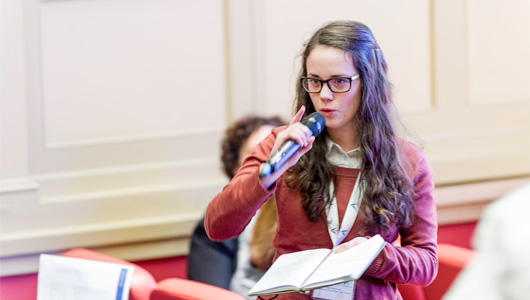
International Education: A student's view
“'Why are you here?' was without a doubt the most common question asked of me at the Cambridge Assessment conference. A valid question when I, the only school student present, stood in comparison to the rest of the attendees; who outstripped me in age, experience and, through a combination of the first two, knowledge. The primary reason was that difference itself, as the questions I already had about international education were being addressed by people whose careers and lives have revolved around the issues and so could share with me a far deeper insight than I would have had access to otherwise, which then prompted my own thoughts.
What are the differences between the education systems being described and the one I experience everyday?"
As a student, I was able to compare my own school experiences with those discussed by the speakers and so raising questions about the proposal or point of discussion covered: How would the international agenda be incorporated into my subjects? What are the differences between the education systems being described and the one I experience everyday?
One of the other questions posed was which of the subjects discussed most interested me, to which – among many 'um's and 'ah's of indecision – I came to the conclusion of Isabel Nisbet's discussion on the practicality of international education and whether it was to be as a subject itself or intertwined with the pre-existing curriculum. I felt personally that, although international education would be beneficial as a new subject, students would not be thrilled by the prospect of doubling the amount of work – as it was mentioned is done in some schools – in order to cover the nationally and internationally centred curriculum.
...I began to realise the important distinction between educating about the world and educating into the world..."
However, to incorporate international education into subjects seems to me a more practical and engaging idea, and one I have experienced in my own English lessons whilst studying 'The Kite Runner' where we researched the social and historical context of Afghanistan; the predominate setting of the novel. Over the course of the conference I began to realise the important distinction between educating about the world and educating into the world; giving students a transnational understanding accompanied by a sense of belonging and responsibility. What chance do we have of instilling students with a sense of global citizenship if they think of other countries as irrelevant to themselves? It is easy to see or hear of the culture or news of another country and feel it is so different that it may as well be another world. This conference has given me a belief in international education as the way to develop a more interconnected view of the globe within my own and future generations."
Bali Birch-Lee
Student, Kesteven and Grantham Girls' School